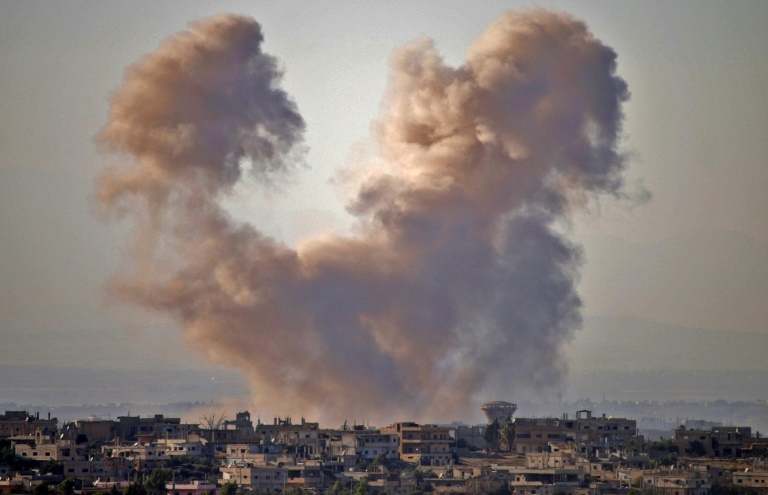
Smoke rises above a rebel-held area of southern Syria during a government air strike on Daraa province on June 27, 2018.(Photo: AP)
A barrage of Russian strikes on rebel-held towns in southern Syria killed 22 civilians on Thursday, the bloodiest day yet of the government's latest offensive in the strategic region.
With Russia's help, Syrian President Bashar al-Assad's army has battered the south for more than a week with air strikes, rocket fire and crude barrel bombs.
The bombardment has forced more than 45,000 people to flee in search of safety, according to the United Nations, while others huddle in their basements to wait out the raids.
On Thursday, dozens of air strikes identified as Russian killed 22 civilians, a monitor said, mostly in the town of Al-Mseifra.
"One of them hit a basement where people were taking shelter, killing 17 civilians, including five children," said the Syrian Observatory for Human Rights.
Russian air raids struck near the hospital in Al-Mseifra on Tuesday night, causing damage that forced medics to close it down, the Observatory said.
The monitor determines who carried out strikes based on the type of aircraft and munitions used, locations and flight patterns.
Another five civilians were killed in other rebel-controlled areas of Daraa, the main province in southern Syria.
"This is the highest toll since the escalation began on June 19," said Observatory head Rami Abdel Rahman, adding that it brought the overall civilian toll since then to 93.
Pressure on Russia
A doctor in Daraa's western countryside said his staff were preparing for an influx of critically wounded from Al-Mseifra.
"Because there are no medical services in the eastern countryside and because of the security situation, most of the wounded will be brought to us in the west," said Baha Mahameed, who manages the Union of Medical Care and Relief Organizations (UOSSM)'s operations in the south.
UOSSM said one of its medical staff was killed late Wednesday in an air strike in Daraa province, the third killed there in less than a week.
The government offensive has already forced five hospitals to close in the past week, including three in the past 48 hours, the Observatory said.
Syria has become infamous for attacks on health workers, with more facilities hit so far this year than in all of 2017.
Rebels hold a horseshoe-shaped band of territory in the south spanning most of Daraa and Quneitra province to west.
They also control southern districts of the city of Daraa, known as the cradle of Syria's seven-year uprising.
The rest is held by government forces, who also control most of Sweida province to the east.
Despite an internationally brokered ceasefire in place since 2017, the regime began ramping up bombardment of rebel-held towns in Daraa on June 19.
Russian warplanes began raids on Saturday and on Tuesday the two air forces launched bombing operations against rebel-held neighbourhoods of the provincial capital.
At the UN Security Council on Wednesday, Britain, France and the United States condemned Russia's role in the offensive.
French ambassador Francois Delattre called on "everyone, starting with Russia, to uphold their commitments so that this offensive ceases immediately".
Displacement 'en masse'
Adopting a divide-and-conquer strategy that served them well across Syria, troops have already lopped off the northeastern arm of the rebel horseshoe.
Thursday's strikes were focused on Daraa's east, with White Helmets rescuers saying dozens of raids hit the towns of Busra al-Sham and Herak and pushed waves of people to flee.
The Observatory said raids were increasingly targeting urban areas.
"The shelling is aimed at cutting off all means of life and to push people out en masse," said analyst Ahmad Abazeid who hails from Daraa.
"The regime and Russians are focusing on areas packed with residents and refugees, to produce the highest number of victims and push these areas to surrender or reconcile," he said.
Rebel-held neighbourhoods of the provincial capital were practically drained of residents.
"All the residents and civilians left. There are no civilians here," said Ahmad Abu Hazem, 26, a rebel fighter inside the city.
Most of the 45,000-plus people who already fled have headed to the sealed Jordanian border.
Officials in Nawa, a rebel-held town heavily hit in strikes on Thursday, issued a statement asking Jordan to take in refugees.
But Amman has said the border will remain closed. The kingdom already hosts more than 650,000 registered Syrian refugees and estimates the actual number is closer to 1.3 million.
To avoid greater bloodshed, Russia is leading talks involving Syria, Jordan, Israel and the United States, but so far there has been no public progress.


